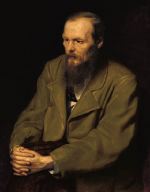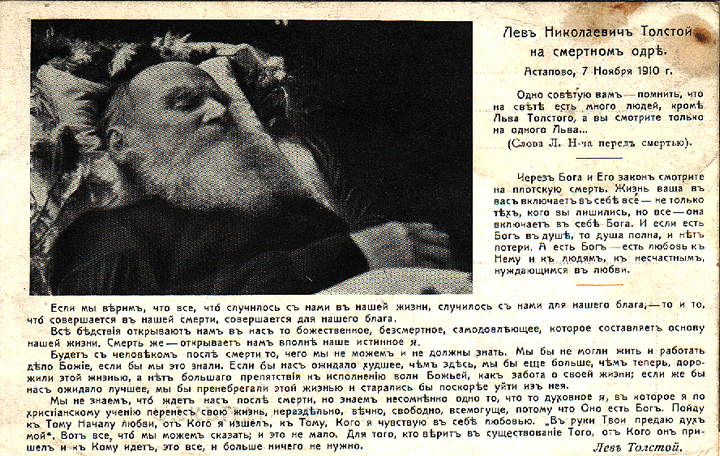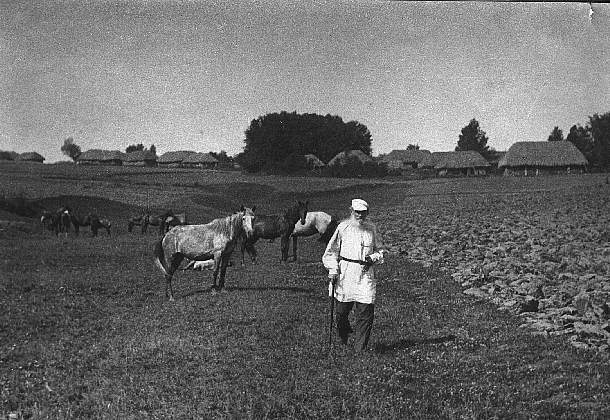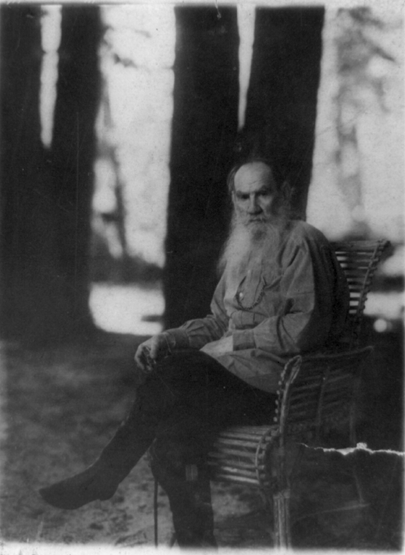
Tolstoy and Dostoevsky
Fall, 2001
Tulane University


This is Tolstoy on his deathbed, Astapovo railway station, 7 November 1910 (old style). The first note quotes him as saying: "I advise you to do one thing — remember that there are lots of people in the world besides Lev Tolstoy, but you still keep looking only at this one man Lev Tolstoy."
Then follows: Look at the life of the flesh through God and his law. Your life in you comprehends everything — not only the people you have lost, but everything. It comprehends God. And if God is in the soul, then the soul is filled and there is no loss. And God is love for him and for people, for the unfortunate, for those who need love.
The text continues under the photograph: If we believe that everything that has happened to us in our lives has happened for our good, then what happens in our death is for our good.
All misfortunes open up to us the divine, the immortal, the self-sufficient in us which makes up the basis of our life. Death, on the other hand, opens up to us our true ego.
What happens to us after death we cannot and should not know. We would not be able to live and do the work of God if we knew. If it should be something worse that awaited us, we would treasure this life all the more, and there is no greater impediment to the work of God than concern for this life. If it should be something better that awaited us, we would neglect this life and attempt to escape it.
We do not know what awaits us, but we do know one thing without doubt: the spiritual ego (self) into which I have brought my life through Christian teaching is indivisible, eternal, free and omnipotent, because it is God. I will go to that source of love from which I have emenated, to him whom I feel in myself to be love. "Into your hands I commend my spirit." This is all that we can say, and this is a considerable amount. For him who believes in the existence of Him from Whom he has come and to whom he shall go, this is all, and nothing more is needed.
Welcome to Russian literature in English! Use Acrobat reader to access the following materials.
| Syllabus | 30 August | |
| Tolstoy Stories Notes | 30 August | |
| Oral Presentation Notes | 6 September | |
| Revised schedule of Tolstoy readings | 20 September | |
| Topics for Crime and Punishment | 22 October | |
| Final Exam | 6 December |
Background notes on Tolstoy 010904.
Yasnaya Polyana. Old Prince Volkonsky and his only daughter Marya + the impoverished Count Nicholas Il'ich Tolstoy, descendent of a Lithuanian knight. Grandfather Ilya the governor of Kazan.
Mother "a myth and a silhouette," died 1830 two years after LN's birth. "From the embryo to a child is an abyss. From non-existence to the embryo is inconceivable."
Ant brotherhood (muravej 'ant' ~ Moravian brothers). First twinge of the ethical shoulder in Tolstoy. Father dies '37.
Obsessions: comme il faut, French, dancing, epic tales, religious mania, gospels, SHE.
Fails entrance exams to Kazan University ('47). Anti-academic stance.
Older brothers take him to a brothel.
Rules for life. Recipes for virtue. Get up early. Have a goal for every minute. Hero: Rousseau.
1847 takes over Yasnaya Polyana. 4000 acres, 330 peasants. "Improve the peasants."
1849 plays cards in Petersburg. 1850 plays the social scene in Moscow.
1851 goes to the Caucausus. Crimean War. Old Cossack Epishka the model for Eroshka in The Cossacks, a drunk, dzhigit, and pillager. "God created everything for the joy of man. Do as the animals do. Where's the sin?"
1852 begins writing his childhood memories, published by Nekrasov in The Contemporary under the title "Story of My Childhood," signed L.N. The life work begins. No metaphor. The wonder of discovery of life. Analystic decomposition, rational demystification. Turgenev loves it. Dostoevsky: "It's good, but I believe he won't write anything else."

Continuation of notes, 010906.
Tolstoy images at http://flag.blackened.net/tolstoy
First great Russian writer: Aleksandr Sergeevich Pushkin, 1799-1837. Founder of contemporary literary language, author of Evgeniy Onegin and "The Queen of Spades." Straddles classicism and romanticism. A man of Petersburg. Killed in duel.
Mikhail Yurevich Lermontov. 1814-1841. A Hero of our Time. Lyric romantic poetry. Killed in duel.
Nikolai Vasilevich Gogol, 1809-1852. Comic realism, moral satire, grotesque. Dead Souls, The Government Inspector. Died insane (being a Russian writer is inherently dangerous).
Tolstoy publishes Childhood, 1852. Enlists as a junker (noble-born private volunteer) in the Crimean war. "Sevastopol Stories". Analysis of the unconscious. Realism, but psychological, not ethnographical. Notion of ostranenie, 'making things strange'. (Russian formalist critic Shklovsky).
Disintegration of complexities, de-labelization, anti-civilization (cf. Mark Twain in Huckleberry Finn). Hostile to formal culture and social institutions. Neglect of contemporary issues to focus on the universal. The inner life. Lack of interest in narrative thrust, avoidance of ornament, focus on synecdoche and selective metaphor. How to justify his life before his conscience.
1862, at age 34, marries Sophie Andreevna Behrs.

------------------------------------------------------------------
Tolstoy in 1908, Yasnaya Polyana.
Read Merezhkovsky on Tolstoy. "A ray of Pushkinian everyday light has been refracted and diffused into the colors of the rainbow." (?)
"The face of L. Tolstoy himself glimmers and flits in the face of this titan." (see images)
"He admired his reflection in the souls of children."
"His consciousness shines from without, like a lighthouse." (good!)
"A born pagan."
"A cracked bell. The inner fissure of the personality."
The teaching of Jesus: "He who does not leave his home and his fields... he is not worthy of me."
"It is easier for a camel to pass through the eye of a needle than for a rich man to enter the kingdom of heaven."
Notes on Dostoevsky. 11 October 2001. Notes from Underground.
For Monday 15 Oct please begin the reading of Crime and Punishment, reading Part I with special care.
Consider in Part I:
- Petersburg and the immediate environment
- the mental state of Raskolnikov and his attitude toward the crim
- the figure of Marmeladov (chapter 2) and his relationship to Raskolnikov and the crime
- the beaten horse in Raskolnikov's dream
- the family situation: Raskolnikov, his mother and his sister (see especially the letter from the mother)
- the murder itself
Secondary literature on Dostoevsky: see the Middlebury website
http://community.middlebury.edu/~beyer/courses/previous/ru351/odost.shtml.
---------------------------------------------
Notes on backgrounds.
Born 30 Oct '21.
m. dies '37. Goes to military engineering school, Petersburg.
'39 father murdered. Darovoe.
'44-'45 Poor Folk triumph.
'46 The Double failure.
1848 revolution. Petrashevsky Fridays, socialism. Arrested April '49.
Fake execution Dec '49. Reprieved, sent to Siberia. 9 years out of literature.
Omsk. '50-54.
'57 married Mariia D Isaeva.
'59 returns to Pete.
'61 edits journal Vremia with brother Mihail.
'61-62 Notes from Dead House.
'62-3. Winter Notes on Summer Impressions.
Apollinaria Suslova affair.
'64 Notes from Underground.
____________________________________
Raphael's Sistine Madonna.
http://www.kfki.hu/~arthp/html/r/raphael/madonna2/index.html